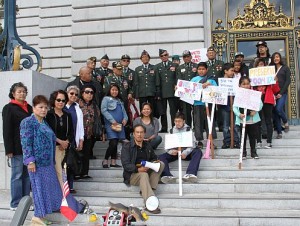Nevada legislators push for Filipino vets compensation
 Showing support to Filipino World War II veterans in Las Vegas, legislators from Nevada have urged colleagues and other government officials to reconsider denied compensation claims of the former soldiers.
Showing support to Filipino World War II veterans in Las Vegas, legislators from Nevada have urged colleagues and other government officials to reconsider denied compensation claims of the former soldiers.
US Representative Joe Heck spoke on the floor of the House of Representatives last July 29 saying,
“I urge my colleagues to join me in fighting to ensure these honorable WWII veterans are appropriately recognized.”
For his part, US Sen. Dean Heller said in an interview, “I want to exhaust all efforts to get this done. I don’t care where they are from. They fought for America.”
Some 24,000 soldiers were denied compensation for services rendered in the war since their names were not on the National Personnel Records Center, also known as the Missouri list which is used determine military service including service given in World War II.
It has been 71 years since these veterans gave their service when President Roosevelt inducted over 40,000 Filipino troops into the United States Army to counter the Japanese threat during World War II. But due to the Rescissions Act of 1946, the service and sacrifice of these brave Filipino veterans would go unrecognized by the US Government for the next 63 years.
It was only in 2009 when Congress finally acknowledged these veterans when it established the Filipino Veterans Equity Compensation (FVEC) fund. But since then, many have been denied and are still waiting to receive compensation.
In his speech last July 29, Heck asked fellow representatives to recognize the contributions of Filipino veterans including those he called “The Mighty Five” who reside in Las Vegas.
“Five of these gentlemen reside in my district. They range in age from 83 to 100 years old. Regrettably, two others recently passed away,” Heck who represents Nev.’s third district said.
“Many more will pass without ever obtaining the recognition they deserve if this body does not act to remove the barriers preventing these veterans from receiving the benefits they have earned,” he added.
Last February, Heck asked the House Veterans Affairs Committee to urgently look into the denial of as many as 24,000 claims of Filipino veterans as well as the administration of the FVEC fund.
In a previous interview, Heck pointed out that, “If there is an individual who already has papers showing proof of service to the military, why are they denied compensation?”
This query is similar to what Heller asked of the Department of Defense in his July 18 letter to Panetta where he urged his department to establish a process that will give Filipinos veterans the opportunity to prove their service.
In an interview the senator from Nevada told Asian Journal, “I hope that he recognizes this. I believe these veterans were improperly denied.” He added that he expects a reply from the Defense department by August 20.
Heller was representative of the state’s second district from 2007 to 2011. He noted that while he voted against the Obama administration’s stimulus bill which also included the FVEC creation, he supports the issue of Filipino veterans.
“It was a matter of bad outweighing the good. I voted against it because it outweighed the good,” noting that he believes that soldiers who were improperly denied should be given compensation.
Meanwhile, a University of Nevada, Las Vegas professor who is bidding to represent the state’s first district in the November election said the Filipino veterans’ issue is one of her main concerns if installed in office.
“It certainly is [my priority]. I represent district that has the most Filipino population. This is not only a very important issue to them, but many constituents are concerned about it as well,” Dina Titus told Asian Journal.
Titus served as representative of the state’s third congressional district from 2009 until 2011.
While in Congress that time, Titus voted for the creation and administration of the FVEC.
“There are several ways to do it while in Congress. You can issue a letter to the President or talk to colleagues to have a hearing on it. Or you can work with liaison from the Secretary of Veterans Affairs to try to get them to do it through regulation,” she said.
“We just have to be sure this happens sooner rather than later because later will be too late for many people,” Titus added.














